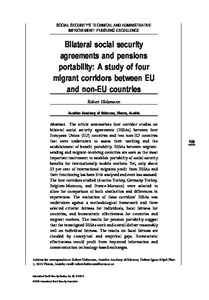Bilateral social security agreements and pensions portability: A study of four migrant corridors between EU and non-EU countries

International Social Security Review
2016
69
3-4
July - December
109-130
migrant worker ; social security administration
Austria ; Belgium ; France ; Germany ; Morocco ; Turkey
Social protection
English
Bibliogr.
"The article summarizes four corridor studies on bilateral social security agreements (BSSAs) between four European Union (EU) countries and two non-EU countries that were undertaken to assess their working and the establishment of benefit portability. BSSAs between migrantsending and migrant-receiving countries are seen as the most important instrument to establish portability of social security benefits for internationally mobile workers. Yet, only about 23 per cent of international migrants profit from BSSAs and their functioning has been little analyzed and even less assessed. The four corridors studied (Austria-Turkey, Germany-Turkey, Belgium-Morocco, and France-Morocco) were selected to allow for comparison of both similarities and differences in experiences. The evaluation of these corridors' BSSAs was undertaken against a methodological framework and three selected criteria: fairness for individuals, fiscal fairness for countries, and bureaucratic effectiveness for countries and migrant workers. The results for pension portability suggest that the investigated BSSAs work and overall deliver reasonably well on individual fairness. The results on fiscal fairness are clouded by conceptual and empirical gaps. Bureaucratic effectiveness would profit from improved information and communication technology-based exchanges. "
Digital
The ETUI is co-funded by the European Union. Views and opinions expressed are however those of the author(s) only and do not necessarily reflect those of the European Union or the ETUI.